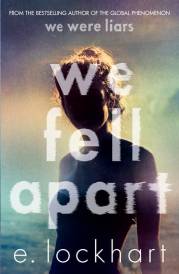Liev Schreiber Defiance & Wolverine Interview
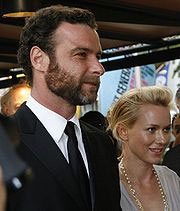
LIEV SCHREIBER DEFIANTLY TAKES ON TOUGH ROLE.
Liev Schreiber, Defiance Interview by Paul FischerLive Schreiber is an actor who rarely plays the same character more than once. Whether he's on stage or screen, the quietly spoken intelligent actor immerses himself in each character he plays, from the Jewish partisan brother in Defiance, to the antagonist in next year's Wolverine. He spoke candidly about both films as well as his next production - baby number 2 with partner Naomi Watts.
Paul Fischer: Did your Jewishness at all help to define your performance in a different way than perhaps if you were not Jewish? Did you approach the role any differently? And have also made a film yourself that dealt with the Jewish experience.
Liev Schreiber: Perhaps. You know? If anything, I would say that it had less to do with being Jewish than it had to do with being of Eastern European heritage. For me, I felt that there were cultural things that I had been afforded more time with, perhaps, than some of the other actors. Because of my family, and also because of the films I'd worked on in the past. But I don't know that any of those really mattered.
Paul Fischer: Did you have a firsthand knowledge of Holocaust experiences that you could defer back to, that you knew about?
Liev Schreiber: No. Only that I'd worked on Holocaust films, and I'd researched Holocaust films in the past. I grew up in the Lower East Side of New York, and I'm half-Jewish and anything that has resonance for me about my family history, because I don't know much about it, I'm drawn to. So I think I choose projects like this, less because I'm right for them, but because I want to know if I'm right for them.
Paul Fischer: Did you feel any similarity to Everything is Illuminated, where you're sort of exploring a lesser-known history, on a bigger scale this time?
Liev Schreiber: For me, yeah. I think Defiance was a continuation of something that I've been interested in a long time, which is - well, let me go back to the beginning here. When I began researching Everything is Illuminated and some other Holocaust films that I did, in speaking to survivors, I found that most of them were really reticent about talking about what had happened to them. And that led me to a really wonderful documentary by a guy named Menachem Daum, called Hiding and Seeking. I won't go into that at any great depth. But basically, it's about a guy who takes his children to meet the Polish woman who hid his parents during the Holocaust, to prove to his rather conservative rabbinical sons that there were good goyim in the world. What I discovered in that film, and in talking to a lot of the people that I talked to, that every year when we memorialize all of these people who died in the Holocaust, in a sense we're forgetting about the ones who survived. And some very - hurtful things obviously happened to those people. And I think because they haven't had an opportunity to deal with it, it brought a tremendous amount of rage, insularism, self-inflicted anti-Semitism. For whatever reason, in order to survive, those people had done truly horrible things. And so that was what I was interested in in Illuminated. The grandfather character. Is that somehow at the core of that survivor's guilt was the person who believed that they had no right to be alive. That if, in fact, they were honest with everyone and themselves, death was the only conclusion, that they felt that they had deserved to die, and for one reason or another, escaped it by generally doing something bad. And when I started to read Textbook and The Bielski Brothers, the other book, and I started to realize what these guys had done, I realized why this story isn't more well-known, because the Bielski brothers didn't want anyone to know it. And that fell in line with my understanding of what surviving the Holocaust cost people.
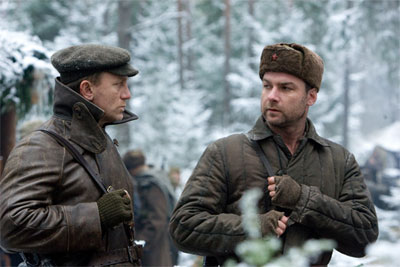 Paul Fischer: Is it a combination of sort of self-loathing for some of the things they did, and also just not wanting to be back in that place mentally? Like, just to talk - like, "I just want a normal life, and to pretend that that didn't happen."
Paul Fischer: Is it a combination of sort of self-loathing for some of the things they did, and also just not wanting to be back in that place mentally? Like, just to talk - like, "I just want a normal life, and to pretend that that didn't happen."Liev Schreiber: That's right. There's no reason for them to remember it. Why should they recall that horror? I'm sure they've had to recall it for 50 years now. Why should they recall it to you, so you can make a film? [LAUGHTER] Hardly a good enough reason, to them. If you think about it. You know, we're all in the movie business, so we think, "Well, why not?" Well, no! [LAUGHTER]
Paul Fischer: Ultimately in making this film, there's got to be some satisfaction in telling a story that people need to know.
Liev Schreiber: Absolutely. But I guess my perspective on it as an actor is that it has to cost something to the character, or it's not going to be evocative in the way that it should, which is that - it's not that they can't simply be heroic, do you know what I mean? Or - there has to be conflict.
Paul Fischer: But that conflict doesn't have to be lurid.
Liev Schreiber: I think sometimes it does, to get you to understand - to me, I believe that. I believe in that, personally. Because I think then you can understand - then you can understand that it isn't black and white. That emotionally, those people are living with things that cost them a great deal each and every day. Like, I - there's a lot of heroic things they do in the film. They - you know, killing other people, so that these people can survive. But if you try to imagine, realistically - and to a degree, this is the actor's job. Try to imagine doing those things. It's - it becomes a different kind of story. For instance, the American GI's had a term called an Bielski enema. And this was - they would take a potato masher grenade, put it in a German soldier's rectum, and let it go off. Which was something that the Bielski's did. Another thing that they did is that people who collaborated with the local police, the Polish police, they were decapitated. And the heads were left in the center of the town with a sign that said, "This is what happens to collaborators."
Paul Fischer: That's not in the movie.
Liev Schreiber: No, it's not in the movie, but if I can own it a little bit as an actor, as a character - if you don't - if you feel a bit of distance from the character initially, and you're struggling with the character's actions, rather than just being asked to adore the character, you have more perspective. And I guess my point in telling you that is that - these were brutal men. And they were brutal men before the Nazis invaded. Now, the real horror is not just that these people were attacked by the Germans. The real horror is that in war, it's these kinds of people that have to rise to the top. That will thrive. When the Nazis invaded Belarusse, and began to speak the language of fear and terror, there was a group of men in that particular town who spoke the same language. And they responded. And that's - you know, I think if you break that down, it's not just about individuals. It's about society. [LAUGHTER] Societies and cultures. And I think you look in Darfur, you see that this tribal thing is endless, because of how people feel they are supposed to respond. Violence is a language.
Paul Fischer: So, as an actor, are you drawn to something like this because of the nature of history, because of the nature of who these characters are?
Liev Schreiber: I think it's who they are. And that's what I like about what Ed does as a filmmaker. Is that he takes these historical events, and he tries to make them personal. Because I think that that's an easier way to help people understand history. So for me, it's about who these characters are, and not what they've done.
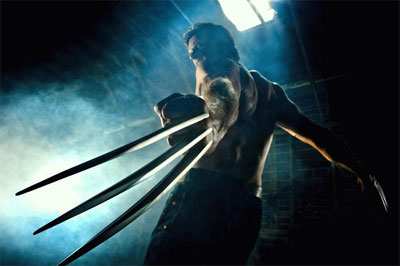 Paul Fischer: Did you ever think you'd be doing a comic book movie like Wolverine?
Paul Fischer: Did you ever think you'd be doing a comic book movie like Wolverine?Liev Schreiber: There's a switch. [LAUGHTER] No, I didn't.
Paul Fischer: There's brutality in that as well.
Liev Schreiber: It was a sort of natural graduation from Defiance, actually. It's true. It was a natural next step.
Paul Fischer: It is an interesting counterpoint. Did Hugh have any advice for doing that kind of movie for you?
Liev Schreiber: Lift weights. [LAUGHTER]
Paul Fischer: And did you?
Liev Schreiber: I did. I lift weights, and I ate an army of chickens.
Paul Fischer: Was it fun for you to be working in Australia on that?
Liev Schreiber: It was fantastic. It was really nice to be in Australia and have a life. To not - you know, sort of be visiting. It was great. It's a great lifestyle there. You know, you wake up at six in the morning and walk along the coast walk along Bondi and Tamarama, and the best coffee in the world, and have a swim, and then go to work. It's really just cushy.
Paul Fischer: So, what can you say about that film, just to touch on it a little, as a character.
Liev Schreiber: I'm very excited about it. I've seen some footage, and I think it's going to be really very good.
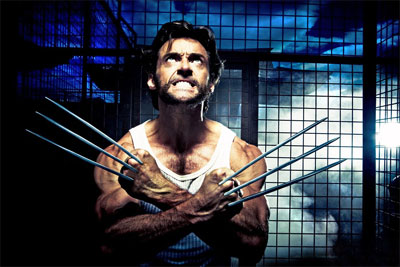 Paul Fischer: How bad-ass do you look?
Paul Fischer: How bad-ass do you look?Liev Schreiber: It's hard for me to say. But I'm really looking forward to people seeing it.
Paul Fischer: Is it fun doing a movie like that, that is such a release from a picture like this, which is so much more intense, and so much more serious, I guess?
Liev Schreiber: I found it to be really intense. The character I play is incredibly brutal and feral, has blood lust unlike any other character I've ever played, much, much more than Zus. Zus is basically a lover. This guy is a real killer.
Paul Fischer: Why did you want to do Wolverine? What was the attraction?
Liev Schreiber: I hope I'm not blowing anyone's cover here, but I don't think men really mature intellectually and emotionally beyond 22. Your bodies evolve, but nothing else, really. And so why should I stop wanting to be in a comic book movie?
Paul Fischer: What was your point of entry? Were you familiar with your character from the comic books at all?
Liev Schreiber: I was a fan of the comic books. I just loved the character of Wolverine. I always have. That sort of deeply ironic and very urban sensibility in a superhero was something that I thought was really groundbreaking. And the style of writing was - particularly the very sort of editorial style. I just always loved it. And I think that we were able to capture some of that darkness in this movie, so I'm very proud of it.
Paul Fischer: Did you enjoy working with Hugh?
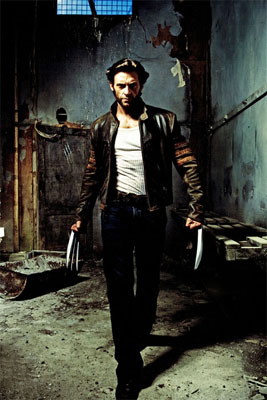 Liev Schreiber: I love Hugh. I mean, Hugh is the reason I did it. We'd been friends for a long time and it's just so much fun to work with him. To do fight scenes with Hugh was really terrific, because as a dancer, he has that kind of discipline and choreography. And I always studied to be a fight choreographer, and always wanted to be a dancer too, but didn't quite have the feet for it. But we had some remarkable fight scenes together, and I'm looking forward to people seeing those.
Liev Schreiber: I love Hugh. I mean, Hugh is the reason I did it. We'd been friends for a long time and it's just so much fun to work with him. To do fight scenes with Hugh was really terrific, because as a dancer, he has that kind of discipline and choreography. And I always studied to be a fight choreographer, and always wanted to be a dancer too, but didn't quite have the feet for it. But we had some remarkable fight scenes together, and I'm looking forward to people seeing those. Paul Fischer: In Defiance you have to speak in Russian? How was that experience, working with the language? And how did you establish the brotherhood, especially Daniel's character? You guys really were brothers in this film.
Liev Schreiber: Thank you. The language meant everything to me. I really loved it when Ed called me and said, you know, "I want you guys to speak some Russian in these scenes." And I got together about three months before we started with a UCLA student here who's a linguist. A guy named Stanislav Srabin, who's a wonderful teacher, who started to teach me Russian. And that was really useful to me. Because I felt that there are a lot of things culturally in the language, that were terrific clues into the character. It's a very masculine language, it's a very direct language. And it - I enjoyed it. I also think if you're going to do a dialect, at least spend a month trying to learn the language. You'll get the dialect that much better. As far as getting to know Daniel - we were in the middle of the woods in Lithuania. And it was - I was just so impressed with the fact that this major motion picture star wasn't going back to his trailer. You know, in between takes. It was freezing out.
Paul Fischer: They said it was a 30-minute hike to the trailors.
Liev Schreiber: Well, that could have been part of it. But he was out there - you know, some of those set-ups took an hour and a half, two hours to accomplish. And he's out there the whole time. He could have - it wasn't quite a 30-minute hike. They might have been exaggerating a little bit. But we were out there. We were out there with nothing to do but sort of spend time with each other. Telling stories, and - you know, having snowball fights, and kind of re-creating the - we were very childish. There was a lot of goofiness. And I think that was about us recreating the childhood that we hadn't spent together.
Paul Fischer: Does a movie like this - I think you can't look at the circumstance of the characters, and wonder, "What would I do?" Did you do that kind of self-evaluation? And how did you measure up in your own eyes? How would you deal with that?
Liev Schreiber: You know, I did do it when there was a scene that I wasn't in. But in the scene where Daniel goes and speaks to the elders of the ghetto, about taking the people out of the ghetto. That was a scene where I thought, "Would I leave the comfort of this structural building, to go and live in the woods with these nuts, in this mass exodus of the ghetto, which anyone could be shot from?" And I thought, "Certainly not." As far as the other stuff, in terms of trying to imagine having lost my own family, and the kind of vengeful rage that might create - I can't even begin to imagine. So, yeah. It's possible.
Paul Fischer: What's next for you, do you know? Do you plan on returning to the stage any time soon?
Liev Schreiber: What's next for me is a production that Naomi and I have been working on for approximately nine months, that - is coming out any day now.
Paul Fischer: When is that happening?
Liev Schreiber: It's imminent.
Paul Fischer: For the holidays, what sort of gifts are you giving, considering these economic times we're in?
Liev Schreiber: I can't give that away before. She'll hear it.
Paul Fischer: Will you go back to Australia for the birth of your child?
Liev Schreiber: Of course, yeah.
Paul Fischer: Are you guys both here right now?
Liev Schreiber: No. She's in New York, I'm here.
Paul Fischer: So you're on red alert, in case?
Liev Schreiber: I'm on red alert.
Wolverine
Starring: Hugh Jackman, Liev SchreiberDirector: Gavin Hood
Genre: Science-Fiction/Fantasy
Hugh Jackman can't escape Wolverine's claws as he returns for a fourth turn as the Marvel mutant. Gavin Hood (RENDITION, TSOTSI) directs this film that takes place before the three previous X-Men movies and explores Wolverine's... Hugh Jackman can't escape Wolverine's claws as he returns for a fourth turn as the Marvel mutant. Gavin Hood (RENDITION, TSOTSI) directs this film that takes place before the three previous X-Men movies and explores Wolverine's mysterious past.
Defiance
Starring: Daniel Craig, Liev Schreiber, Jamie Bell, Alexa Davalos, Allan Corduner, Mark FeuersteinDirector: Edward Zwick
Rated: R [See Full Rating] for violence and language
Genre: Action/Adventure
Based on an extraordinary true story, DEFIANCE is an epic tale of family, honor, vengeance and salvation in World War II. The year is 1941 and the Jews of Eastern Europe are being massacred by the thousands. Managing to escape certain death,... Based on an extraordinary true story, DEFIANCE is an epic tale of family, honor, vengeance and salvation in World War II. The year is 1941 and the Jews of Eastern Europe are being massacred by the thousands. Managing to escape certain death, three brothers take refuge in the dense surrounding woods they have known since childhood. There they begin their desperate battle against the Nazis. Daniel Craig, Liev Schreiber and Jamie Bell star as brothers who turn a primitive struggle to survive into something far more consequential - a way to avenge the deaths of their loved ones by saving thousands of others. At first it is all they can do to stay alive. But gradually, as whispers of their daring spreads, they begin to attract others - men and women, young and old - willing to risk everything for the sake of even a moment?s freedom. Tuvia (CRAIG) is a reluctant leader and his decisions are challenged by his brother, Zus (SCHREIBER) who worries that Tuvia?s idealistic plans will doom them all. Asael (BELL) is the youngest - caught between his brothers? fierce rivalry. As a brutal winter descends, they work to create a community, and to keep faith alive when all humanity appeared to be lost.
*Liev Schreiber & Naomi Watts image from Wikipedia.
MORE




